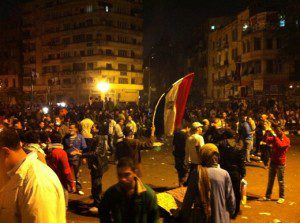I’ve learned to limit consumption of Tom Friedman, except when he talks about the Middle East…yesterday his column suggested that the Arab Spring should be renamed in light of recent events…I think he is on to something, but I doubt his suggestion of “The Arab Quarter Century” will fly…my suggestion is the “The Arab Turn”, which connotes both the significance of current events in the region and recognition of some kind of new era in the making, but leaves open the outcome…what do you think?
Dr. Jeffrey A. Stacey is currently Managing Partner of Geopolicity USA, an overseas development firm. Formerly he was Senior Fellow at the Center for Transatlantic Relations at SAIS, before which he served in the Obama Administration as a State Department official specializing in NATO and EU relations at the Bureau for Conflict Stabilization Operations. At State he founded and managed the International Stabilization and Peacebuilding Initiative (ISPI), which has over 20 government and international organization partners.
Dr. Stacey is the author of "Integrating Europe" by Oxford University Press and is currently working on a follow-up book entitled "End of the West, Rise of the East?" He has been a guest blogger at The Washington Note and Democracy Arsenal, a professor of U.S. foreign policy at Tulane University and Fordham University, a consultant at the Open Society Institute and the U.S. Institute of Peace, and a visiting scholar at George Washington, Georgetown, and the University of California. He received his PhD from Columbia University.



I would suggest naming it with one of the many options provided to you by the ‘Arabs’ themselves; intifada, thawra, nahda, etc. Both ‘Arab Spring’ and ‘Arab Turn’ are steeped in Orientalism. Just call them the Arab Revolutions; which is what they are, the outcomes of revolutions, moreover, are always uncertain; what exactly is the problem with that name?
So while I concur about “Spring” being orientalist and find “Awakening” (another recent formulation I’ve heard; most recently at ISA) suggesting that folks were somehow “asleep,” I’m hesitant to go with revolutions, but that may be because my day job is (at least theoretically) studying revolutions. I’m hard put to see how any of these cases qualify as revolutions, at least as we most commonly conceive of them (which doesn’t mean we couldn’t or shouldn’t and perhaps some of the comparisons to 1989’s revolutions/refolutions seem apt….) and of course it carries with it some orientalist assumptions of its own (for most folks harkening back to France 1789). So, er, what is to be done (per a European revolutionary of old)? Perhaps “Uprisings”? “Revolts”? Both seem closer to satisficing than satisfactory.
All of which is to say I too would welcome thoughts/discussion. While you’re at it, if you have thoughts about the various “indigent” movements across Southern Europe, Chile, Mexico, and, perhaps least interesting. the US , I’m flailing about for a handy moniker there too.
Nice one: “I’ve learned to limit consumption of Tom Friedman, except when he talks about the Middle East.” Laughed a bit on that one. I thought the same thing (https://twitter.com/Robert_E_Kelly/status/321976407389503488).
As a recovering liberal I have discovered I have an “Inner Tom Friedman” who will put a positive Pangloss on anything. I had my AA moment when I finally saw old Tom’s Single Malt as ‘the Kool-Aid’ when he comfortingly lauded the Muslim Brotherhood as moderate. I could no longer stifle the inner voice that pointed out quite reasonably that the MB are the founding organization of Islamism. I might wish they were moderate, heck, my Stockholm Syndrome might insist that i see ’nuffink’, like Sergeant Schultz. But projection is projection whether in the from of Orientalism or the cognitive egocentrism that devoutly insists ‘the other’ shares our democratic, win win, values. Postmodernism should give us more tools to appreciate that ‘the other’ may feel entirely differently than anything we can conceive. Let’s listen to what they say, and include it in our calculations. I think any of our usual terms fall short. Revolution emphasizes the political and as has been pointed out can invite misleading comparison with previous revolutions. The most useful comparison I’ve encountered has been the comparison of how the MB in Egypt took over a popular uprising much as the Bolsheviks did the Russian Revolution.That is, by being better organized politically and more ruthless ideologically. But that misses the entire religious side of the Arab uprisings – the demand for Sharia based legal systems seems more reminiscent of the counter reformation in the West than a secular political upheaval. Western culture got very anxious and cranky after the discovery of the new world and the emergence of Protestantism and took to burning witches. Social upheaval can trigger powerful movements to stop or reverse change – particularly when it is coming from outside a culture. I’m suggesting digging a bit deeper into our bag of experiences to project on Islamist and then to listen to what they have to say no matter how much it violates our belief system and values. Example. I was sitting in a friends back yard having a few beers with a group of about 7 or 8 people, one of whom was a recently arrived West Indian who was explaining how Rastafarians function as a kind of local government in their neighborhoods. It all was an interesting cultural exchange until someone of our group asked about gay people. The answer – “Oh, mon, we just kill them.” That is an example of the kind of moment where you have to sit up and take notice that something important has happened. That your projections may, like Old Tom’s, be misleading
removed by author
Interested to know why you think Tom Friedman is worth listening to on the Middle East?
Touche everyone…TF is often a cross between Dr. Pangloss and Dr. Strangelove…while he gets pretty annoying when opining on our flat world or for the hundredth time declaring a universal trend based upon speaking to one person on the street, he at least knows the Middle East well enough to get what’s going on…at times his recommendations for how to handle things get a little far-fetched, but he is valuable to hear out when analyzing the region
https://www.dailystar.com.lb/Opinion/Columnist/2011/Aug-17/Drop-the-Orientalist-term-Arab-Spring.ashx
Rami Khouri’s essay on this from 2011.